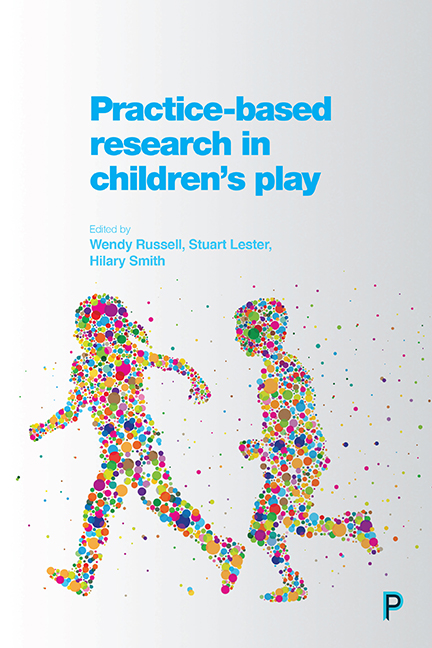Book contents
- Frontmatter
- Contents
- List of figures
- Notes on contributors
- Acknowledgements
- Foreword
- One Perspectives on play research: the practice-theory-research entanglement
- Part One Then and now: historical perspectives
- Part Two Here and there, this and that: spatial and creative perspectives
- Part Three Playfulness and wellbeing
- Closing thoughts
- Appendix: The Playwork Principles
- Index
Eight - Your space or mine? Play in out of school clubs
Published online by Cambridge University Press: 05 April 2022
- Frontmatter
- Contents
- List of figures
- Notes on contributors
- Acknowledgements
- Foreword
- One Perspectives on play research: the practice-theory-research entanglement
- Part One Then and now: historical perspectives
- Part Two Here and there, this and that: spatial and creative perspectives
- Part Three Playfulness and wellbeing
- Closing thoughts
- Appendix: The Playwork Principles
- Index
Summary
Introduction
The origins of this study are rooted in a desire to explore adults’ design intentions for environments for children's play. Through observations it was evident that there were many complex pressures that affect the design of such environments and this study seeks to examine the context or ‘how and why’ behind the adult design process and whether playwork interventions work to maintain these design intentions.
There are accepted fundamental writings and theories that underpin the development of a playwork approach in the UK (for example, Sturrock and Else, 1998; Brown, 2003; Hughes, 2003; 2012). However, there is little research that explores the ways in which playwork theory informs practice. While contemporary research into children's play embraces an increasing inter-disciplinary approach (see for example Fagen, 2011; Woodyer, 2012), few published works in playwork utilise recent theorising; there remains a persistent gap in academic literature which examines the ways in which playwork understandings and practices support or constrain environmental conditions for children’s play. This is particularly noticeable in the UK context of ‘out of school care’ where research is limited and generally focuses on the economic value of provision for supporting adults into the labour market or enhancing children's social skills or educational attainment (see, for example, Barker et al, 2003; Wikeley et al, 2007). While out of school care may be ascribed, following Beunderman (2010), with important instrumental and institutional value, little attention has been given to the ways in which settings recognise and support the intrinsic value of play (see Smith and Barker, 2000a; 2000b; Smith, 2010; and Kane, 2015 for exceptions). As Beunderman (2010) asserts, it is this intrinsic value, that is, the freedom, fun and enjoyment associated with playing, that gives rise to potential instrumental and institutional benefit and as such must be the primary focus for playwork provision. Given this, the overall intention of this study was to provide practice-based research into the phenomenon of constructions of space in play settings. The intention in this small-scale case study is not to generalise, rather it is to suggest ways in which we can pay greater attention to the everyday and particular actions of playworkers to better understand the complex processes involved and how they may inhibit or support conditions for playing.
- Type
- Chapter
- Information
- Practice-Based Research in Children's Play , pp. 131 - 146Publisher: Bristol University PressPrint publication year: 2017



